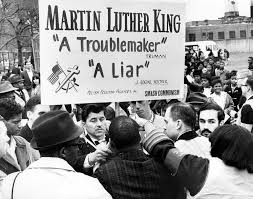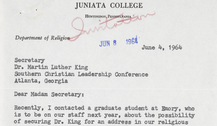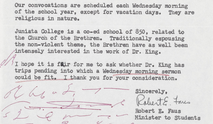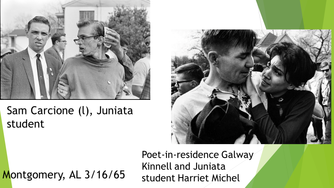 John 1:35-39a What’s your favorite title for Jesus? Your favorite name to call on. Teacher, savior, lord, brother… In this morning’s scripture John the Baptist calls Jesus “the Lamb of God” and his disciples call him “Rabbi” and Jesus has new titles to add to the ones we claim from the OT predictions: Wonderful Counselor, Mighty God, Prince of Peace” and “Immanuel” which the book of Matthew cites from Isaiah’s prophecy. All these titles, these names, introduce us to Jesus, just like we use titles and names to introduce ourselves. Anytime I’m in a group and we’re going around introducing ourselves I say “My name is Anna Lisa” rather than “I am Anna Lisa.” It’s a subtle difference but it matters to me, because I have a name, but I am not my name. Who I am is deeper. I am female, a young adult, a daughter, a sister, a spouse, a friend, a neighbor, a pastor, a writer, and still who I am is deeper and broader than all of that. So we do need the shorthand. We need names to call one another, rather than trying to use all the labels that might apply. And we need to remember that the names and titles we use for each other are not the fullness of who one another really is. When Jesus met up with John and his disciples he wasn’t satisfied by their titles for him – Lamb of God, and Rabbi. He invited them to “come and see” because only sharing time and space could adequately introduce them to one another. That’s what Martin Luther King, Jr. knew, as well. He knew that black and white people in this country rarely live alongside one another, and the time we spend together is often part of a commercial transaction. Churches, families, civic organizations, neighborhoods – the places we make our most significant relationships – are the most segregated parts of our country. In fact, school segregation is more extreme (by some measures) now than it was when Martin Luther King was working for civil rights[1] and the Brown vs. Board of Education ruling was well underway. Martin Luther King repeatedly called for integration in the civil rights movement and in all aspects of our society. He honored the deep and sacred humanity of all people in his preaching and speaking, because we won’t bother to see underneath labels and stereotypes if we don’t believe that one another are belovedly created by God. By preaching his hope for humankind to become the best we can be, King taught us that integration and justice are worth working for. But you’ve heard all this before, you know what we’re supposed to say about King and the clichés of this holiday are just one way it’s problematic for a predominately white church to celebrate King’s legacy. How can I say something that really matters – something that is relevant to the real suffering that so many black Americans experience today, without sending us into white guilt and despair that does no good? What fresh and relevant gospel good news can we share today? I invite you to listen with the open mind and young ears of the 4-year-old girl in the following story, told by her father to This American Life: https://www.thisamericanlife.org/radio-archives/episode/188/kid-logic (story from Act 1, around minute 13) There’s so much to appreciate in this story – her genuine thirst for the gospel good news of Jesus, her enthusiasm for what is good and loving in this world, and then we get to her last question, “Did they kill him too?” Though Jesus and King were killed nearly 2000 years apart, they were killed by similar fears and greed come to life in the exploiting systems of their day. It’s easy and overwhelmingly common to celebrate Martin Luther King today, but when he was leading marches in the 1960s most Americans had negative opinions of him, according to Gallup polls.[2] The labels and titles we give Martin Luther King today are not the ones many of our parents or grandparents used when he was alive.  Today we call him a civil rights leader but during the 60s he was often called an agitator, or a communist. It wasn’t just his work for racial and economic justice that angered many Americans – as he spoke out against the Vietnam War, people condemned him even more. Today we think of King as the peaceful leader, compared to our stereotypes of Malcolm X or the Black Panthers, but even most church people in the 60s thought King was going too far. The Church of the Brethren, though, was more supportive than most. Because we have traditionally committed to peace and non-violence, we were more invested in the Southern Christian Leadership Coalition and King’s work than most predominately white churches. Researching for this sermon I found letters between the General Offices in Elgin and SCLC. I also found this letter  The visit never happened, still, King inspired Juniata students, and in 1965 a group of student, faculty and local clergy went to Alabama to support a voting rights march from Selma to Montgomery, the county seat, where eligible voters would attempt to register to vote.[3] “What’s going on down south? Why can’t they vote?” Pennsylvania college students wondered. “Come and see” said many black people in Alabama. It’s dangerous to “come and see.” Watching the evening news from an armchair is much safer – at least physically safer, though keeping distance from the ache of the world breaks our hearts and our spirits. It took three tries to start the march from Selma to Montgomery – you should ask Jim Tuten about it after worship – he wasn’t there, but he teaches about it. On the first try, Sunday, March 7, 600 people dressed in church clothes peacefully walked across the Edmund Pettis Bridge until they were attacked with tear gas and clubs by state troopers.  J.L. CHESTNUT, Selma’s first black lawyer, said, “When it was over, I walked back across the bridge, literally crying, and saying to myself, I don’t think America can be saved.” Following the violence that left at least 70 people injured and 17 hospitalized…Martin Luther King Jr. urged supporters from around the country to converge on Alabama to complete the march from Selma to Montgomery on March 16. Juniata marchers came to Montgomery and remember, “They stopped us and surrounded us on a street in this deserted quarter and they wouldn’t let us go forward or back.”…“When it came to hitting, they had a priority list. They’d go for the white men first, then the black men, then the black women, then white women. It was their bit of chivalry. I asked one trooper, ‘What are you going to tell your grandchildren?’ He didn’t have an answer.[4]” Revolutionary leaders like Jesus and Martin Luther King love people so much that their only choice is to confront the systems, the institutions – even the government – even the churches – that oppress and harm people. Martin Luther King and the Civil Rights Movement brought a glimmer of integrity to American democracy for the first time in our history, because finally, all eligible voters might actually be allowed to vote! We were not a democracy until the Voting Rights Act of 1965 was passed, and the marches in Alabama that spring were the final push that President Lyndon Johnson needed to send the bill to Congress. Students and faculty from Juniata, along with thousands of people from around the country, risked their lives to help their country be better – and it worked. Pastor William Sloane Coffin writes, I think we can say that democracy is a form of government that demands more virtue of its citizens than any other form of government, but I do not think we can say that democracy guarantees that the virtue will be exercised. So let us term freedom of choice less a virtue than a necessity, a precondition to real freedom, which is the ability to make choices that are generous, living, and wise. Our wills are not free when they will what is bigoted, narrow, ungenerous. Our wills are only free when they can will the will of a loving God. ‘Thy will be done on earth.’ This year as we celebrate Martin Luther King and the Civil Rights Movement, the protections of voter access made through the Voting Rights Act are being stripped away more quickly than at any time since it passed in 1965. Wondering what might make it hard to vote in this country? The people of Texas invite you to “come and see.” We humans are naturally inclined to stereotype people, our labels and categories are often useful and efficient. They can keep us safe. And they can often turn us suspicious and simply be wrong. Jesus was gifted with Divine Vision, seeing past labels. He sees the paralyzed man waiting by the pool at Bethesda, he’d been waiting 38 years to get in the waters when they swirled with angelic healing power. Jesus doesn’t sit down with us in our armchairs and wonder why the man didn’t get some help during those 38 years – couldn’t he have found the proper channels or filled out the right forms? – no, Jesus gets up close and actually talks to this man, and brings him to life. Later in the book of John we read, Jesus saw a man who had been blind since birth. His disciples asked him, "Rabbi, who sinned, this man or his parents, that he was born blind?" Jesus replied: "Neither this man nor his parents sinned," said Jesus, "but this happened so that the works of God might be displayed in him. As long as it is day, we must do the works of the One who sent me. Night is coming, when no one can work. While I am in the world, I am the light of the world." Having said this, he spat on the ground, made some mud with the saliva, and put it on the man's eyes. “Go,” he told him, “wash in the Pool of Siloam.” So the man went and washed, and came home seeing. The others are content to sit around and discuss why the man is blind, whose fault it is. Like when we sit around and ask what Michael Brown did to get killed by Darren Wilson. Jesus doesn’t sit with us in our armchairs assigning blame, he reaches out with mercy, with tenderness, with – rather surprisingly – spit and dirt on his fingertips and sees this blind man in his illness and also in his wholeness. The pastor Fredrick Buechner writes, When Jesus comes along saying that the greatest command of all is to love God and to love our neighbor, he is asking us to pay attention. If we are to love God, we must first stop, look, and listen for God in what is happening around us and inside us. If we are to love our neighbors, before doing anything else we must see our neighbors. With our imagination as well as our eyes, that is to say like artists, we must see not just their faces, but the life behind and within their faces. Here it is love that is the frame we see them in. “Where are you staying, Jesus?” John’s disciples ask. “Come and see.” Amen. The choir is going to sing Martin Luther King’s favorite hymn – as we train ourselves to get closer to one another and see each other with love and curiosity, rather than staying at a distance in fear or weariness, we miss the mark again and again. May we find comfort in our Creator, who sees with clarity and tenderness each part of this Holy Creation. [1] http://www.huffingtonpost.com/2014/07/02/civil-rights-act-anniversary-racism-charts_n_5521104.html [2]http://www.gallup.com/poll/149201/Americans-Divided-Whether-King-Dream-Realized.aspx [3] https://www.juniata.edu/about/news/archive.php?action=SHOWARTICLE&id=1371 [4] http://people.com/archive/the-selma-march-40-years-later-from-the-front-lines-of-freedom-vol-63-no-9/
1 Comment
7/27/2019 08:43:23 pm
We cannot deny the fact that Martin Luther King has left a huge legacy to all of us. May it be through the words he say, pieces that he wrote, or the songs that he sang though he isn't a full-pledged singer. Everything is just admirable about him and how I wish I got the chance to know him even better. he isn't perfect, but I can definitely say that he was able to live his life the right way and he could serve as an inspiration for all of us!
Reply
Leave a Reply. |
Archives
January 2022
|

 RSS Feed
RSS Feed